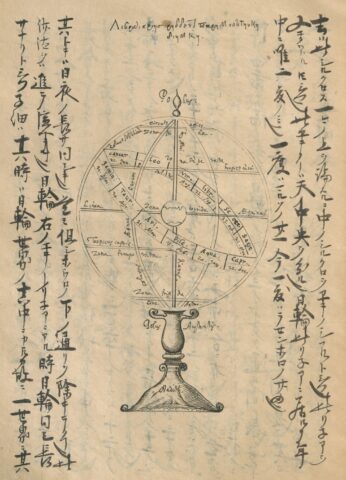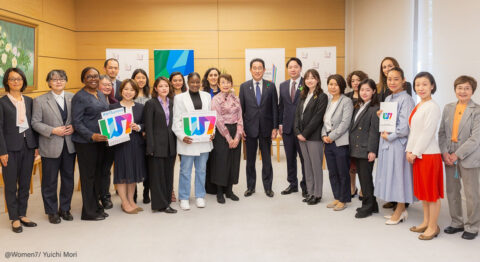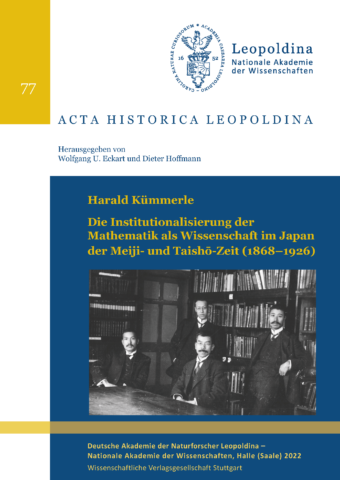Events and Activities
David M. Malitz analyses Japan’s diplomatic reaction to the war in the Middle East

The online journal International Politics and Society (IPS) has published an article by DIJ researcher David M. Malitz analysing Japan’s diplomatic reaction to the war in the Middle East. In “Guardians of the international order”, David explains that some of the criticism Japan has received for its cautious response to the war is undeserved. As he writes, it would “be wrong to play up or misinterpret why Japan did not sign the ‘Joint Statement on Israel’ with Germany, the United Kingdom, France, Italy and the United States on 9 October. Japan could not back the phrase ‘our countries will support Israel in its efforts to defend itself’ because its law prohibits exporting weapons.” Notwithstanding, high-ranking Japanese diplomats condemned the ‘terror attacks’ by Hamas and ‘expressed solidarity with the Israeli people’. “Japan has again demonstrated that it shares the same values and that its main concern is maintaining the rules-based international order”, David concludes. The article is also available in German here.
Hybrid Study Group discusses Japanese career women’s identity conflict

This presentation explores how career-minded Japanese women experience and respond to identity conflict. Based on 125 in-depth interviews with Japanese women who face incompatible expectations for their roles in their professional and private lives, it shows how this dilemma leads to an identity conflict to which the women react with different identity work strategies: Individuals may either sacrifice their career ambitions or forego starting a family; alternatively, they might attempt to reconcile professional and personal role expectations by relinquishing perfectionism in both spheres, or seek partners whose personal expectations align more closely with their career objectives. While these strategies may resolve incompatible external role expectations, this study reveals that they do not effectively diminish internalized dilemmas. Possible solutions to resolve the dilemma will be discussed. Details and registration here
Torsten Weber bespricht Nationalmuseum für Japanische Geschichte

DIJ Historiker Torsten Weber hat für die neueste Ausgabe der Geschichtszeitschrift Werkstatt Geschichte (Vol. 31, No. 88) die Dauerausstellung des Nationalmuseums für Japanische Geschichte in Sakura (Chiba) besprochen. In “Vielfalt als Nationalgeschichte. Das japanische Rekihaku Museum” erklärt er die Entstehungsgeschichte des Museums, sein pädagogisches Konzept und die wichtigsten Exponate der sechs Abteilungen. Das Museum, das 2023 sein 40-jähriges Bestehen feiert, zeichne sich vor allem durch seinen Fokus auf Alltagsgeschichte, innerjapanische Diversität des historischen Erlebens sowie transnationale Verbindungen japanischer Geschichte in Ostasien aus. Außerdem reflektiere die Dauerausstellung zur Geschichte Japans von der Prähistorie bis zur Gegenwart den aktuellen Forschungsstand und adressiere auch offene Forschungsfragen. Darüber hinaus biete sie durch Film, Musik, zahlreiche “Science Lab”-Stationen und eine Tempelschule zum Mitlernen Einblicke in die Arbeit der Kuratoren sowie abwechslungsreiche pädagogische Elemente. Der Ausstellung gelinge es, stereotype Simplifizierungen zu vermeiden und präsentiere “die Geschichte Japans fast komplett ohne einen expliziten Fokus auf die Nation”.
Harald Kümmerle speaker at Oxford’s Free and Open Indo-Pacific conference

DIJ researcher Harald Kümmerle will present his paper on “‘Data Free Flow with Trust’ as a pillar of economic security in the digital realm” at the conference The Free and Open Indo-Pacific: Japan’s Strategic Vision Goes Global at Oxford University on March 11. Harald’s paper will highlight Japan’s initiative Data Free Flow with Trust (DFFT) as an important aspect of the development of economic security in the digital realm. He will discuss DFFT as a promising regulatory framework for the cross-border flow of non-personal data. One focus of his talk will lie on the data regulation and economic security discourse involving a variety of actors and positions that followed a scandal concerning the access of private data of Japanese social media users by a Chinese subcontractor firm. The two-day conference exploring the Indo-Pacific’s role in global politics is hosted by Oxford University’s Nissan Institute of Japanese Studies. Details here
Hybrid Study Group on AI and Jesuit Written Artefacts

Between 1595 and 1610, the first recorded contacts between Europeans and Japanese took place. In the Jesuit Colleges in Kyushu, lectures were delivered on Aristotelian philosophy, theology, and Ptolemaic cosmology. In Germany, almost 450 years later in 2019, this tripartite work on science and religion is discovered in the Herzog August Bibliothek Wolfenbüttel: the first complete Japanese translation of the so-called Compendia compiled in Japan. Bridging the gap between computer science and historical linguistics, this talk will present a novel approach of understanding this written artefact by applying the possibilities artificial intelligence offers. It will address the challenges of finetuning AI-powered tools to historical Japanese, training AI models for text recognition in multiple text directions and writing systems, coding scripts tailored to historical romanization, and conducting quantitative analysis of a comparative text corpus of Jesuit codices. Details and registration here
Hybrid Study Group on Feminist Foreign Policy in Japan

In recent years, feminist foreign policy (FFP) has become a buzzword in foreign policy. Since 2015, the Japanese government has been trying to push for more gender equality in its foreign policy and adopted a National Action Plan on Women, Peace and Security. In 2023, the Kishida cabinet appointed the second woman in Japan’s history as foreign minister and Japan’s latest National Action Plan includes even more gender-sensitive norms. At the same time, Japan is under intense scrutiny for consistently ranking last among G7 countries on gender equality and women’s empowerment. This clashes sharply with Japan’s international image as an ethically “good state”. Against this background, this lecture examines how Japan attempts to catch up with the international trend of FFP and the promotion of pro-gender norms in its foreign policy. Details and registration here
Co-authored book chapter by Nora Kottmann examines Japanese singles and solo-life

The average age of first marriage in Japan has steadily increased over the last century, as has the likelihood of never marrying, for both women and men. In conjunction with the decline in average length of marriage, these trends indicate that Japanese people are spending more of their lives singles, in the sense of being legally unmarried. Against this background, the chapter “Japanese Singles and Solo-Life”, co-authored by Laura Dales and former DIJ researcher Nora Kottmann discusses the implications of singlehood and the ways that being single and solo activities (sorokatsu) have been framed and re-framed in the wake of the 2020 COVID-19 pandemic. The authors explore the possibilities for belonging, as well as marginality, in singlehood at a time when intimate and relational practices are shaped by the proscription of the ‘3 Cs’ (closed spaces, crowds, and close-contact situations). The chapter was published in Singular Selves: An Introduction to Singles Studies (Routledge India 2024), edited by Ketaki Chowkhani and Craig Wynne.
New book by Harald Kümmerle on Mathematics as science in Japan
 The new open access book Die Institutionalisierung der Mathematik als Wissenschaft im Japan der Meiji- und Taishō-Zeit (1868–1926) by DIJ researcher Harald Kümmerle examines the rapid institutionalization of mathematics as a scientific discipline in Meiji and Taishō-era Japan. This development was based on a rich pre-existing tradition of knowledge and is analysed with a focus on the foundations, the course, and the characteristics of knowledge circulation. To this end, Harald’s study examines the organisational formation, standardisation, professionalisation, and disciplinary formation of mathematics in Japan. The book is published in the Acta historica Leopoldina series (vol. 77) by Wissenschaftliche Verlagsgesellschaft Stuttgart. It is based on Harald’s PhD dissertation which was awarded the Johannes Zilkens Dissertation Award in 2020.
The new open access book Die Institutionalisierung der Mathematik als Wissenschaft im Japan der Meiji- und Taishō-Zeit (1868–1926) by DIJ researcher Harald Kümmerle examines the rapid institutionalization of mathematics as a scientific discipline in Meiji and Taishō-era Japan. This development was based on a rich pre-existing tradition of knowledge and is analysed with a focus on the foundations, the course, and the characteristics of knowledge circulation. To this end, Harald’s study examines the organisational formation, standardisation, professionalisation, and disciplinary formation of mathematics in Japan. The book is published in the Acta historica Leopoldina series (vol. 77) by Wissenschaftliche Verlagsgesellschaft Stuttgart. It is based on Harald’s PhD dissertation which was awarded the Johannes Zilkens Dissertation Award in 2020.

















 Open Access
Open Access
